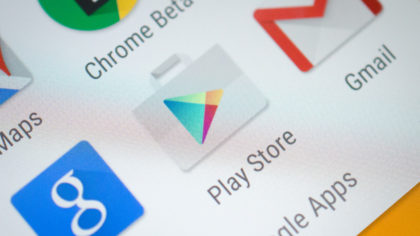Google to Allow Gambling Apps in Play Store
Whether it is because there is potentially a lot of money to be made in gambling or the company is finally just giving in, Google will soon be lifting its ban on gambling apps in the Google Play store. According to a report by Andrew Daniels, the managing director of UK-based tech firm Degree 53, e-mails have been going out to online gambling companies informing them of the change in policy.
![]() Gambling apps have been banned from the Google Play store, far and away the most common source for Android apps, since 2013. Google’s Developer Policy Center website still has the rule in place:
Gambling apps have been banned from the Google Play store, far and away the most common source for Android apps, since 2013. Google’s Developer Policy Center website still has the rule in place:
“We don’t allow content or services that facilitate online gambling, including but not limited to, online casinos, sports betting, lotteries, or games of skill that offer prizes of cash or other value.”
Google does permit gambling ads, as long as they abide by local laws and regulations, do not target children (are not in apps geared towards children, for example), the landing page for the ad has responsible gambling information, and the app in which the ad appears is not a play-money gambling app.
Two of Degree 53’s clients are gaming firms BetFred and 888 Holdings. Andrew Daniels reported that he received a copy of the e-mail from Google, which was sent to companies in the UK, Ireland, and France.
“From the beginning of August 2017,” Daniels said, “Google will accept applications for the distribution of gambling apps within the Play store in the UK, France and the Republic of Ireland. At a later date, this policy change may be expanded to new regions and countries.”
App developers will be required to submit all documentation that shows they are licensed in the jurisdictions where they wish to offer the gambling app. This would imply that an online poker room like, say, partypoker, could submit an application, but could not make its app available in the Google Play store for people in the United States.
Gambling apps are currently available on the Android platform – most poker rooms, for instance, have one by now – but they are not readily available to download in the Google Play store. To install these apps on their mobile devices, people must “sideload” them, that is, download them from the provider’s site directly and install them manually. It is typically an easy process, which starts with navigating to the device’s settings and choosing the “Security” option. Once there, the toggle switch for “Unknown sources – Allow installation of apps from unknown sources” should be turned on.
The above sounds scary, but all it means is that you can install an app you download from anywhere, not just the Google Play store. Certainly, one should be aware of where the app comes from and trust the source, but generally, this isn’t a problem unless you routinely go to shady sites and download things willy-nilly.
Once that is done, just go to the gaming site of choice and click the link provided on the site to download the app, which will usually be in the form of a file with an “.apk” extension. Once it is downloaded, click on the file in the device’s file manager (or click on the download notification) to install it. It’s very similar to download an app on a PC.
There used to be an independent app store dedicated to real-money gambling apps called Betcade, but it shut down in January after living for about 15 months.
Now, some of you might be saying out loud – yes, out loud, because that is the impact my writing has on you – “Wait, I have daily fantasy sports apps on my phone and I downloaded them from the Google Play store. I thought Google didn’t allow gambling apps in the store.”
You would be right on all accounts. Even if you consider DFS a game of skill and not gambling (why not both?), it still isn’t permitted in the store according to Google’s rules. Ahead of the 2015 NFL season, though, Google approved the DraftKings and FanDuel apps in the Google Play store as part of a limited trial for DFS. Since then, other DFS operators have had their apps made available, as well.
Of course, as anyone who is familiar with mobile games knows, even though it has been against Google policy to allow gambling apps in the store, tons of games involve variations of gambling. I mean, what else do you call it when someone spends real money to buy in-game coins to then, in turn, buy some sort of loot chest that may or may not contain a powerful in-game item? It’s not technically considered gambling because the money is spent on in-game items and those items have no value outside of the game, but if it wasn’t for this sort of concealed form of gambling, there would be many fewer games in the Google Play store.



















COMMENTS